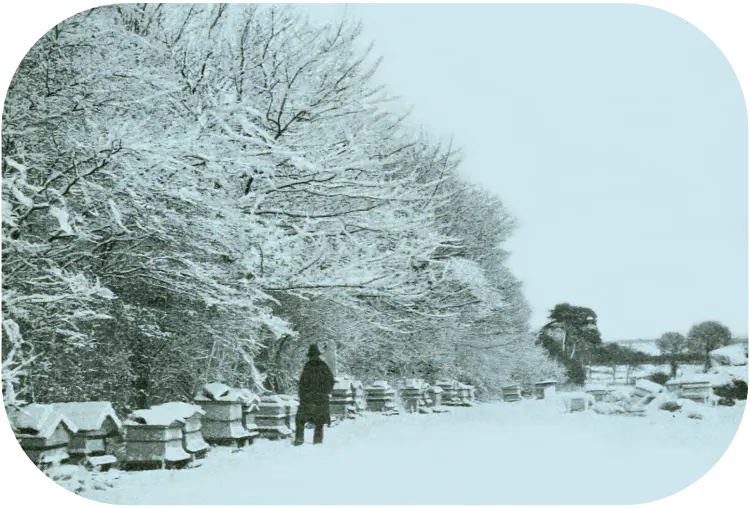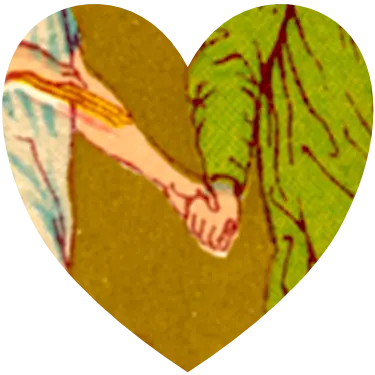Yuletide is upon us, so I thought it would be a pleasant diversion to revisit William Woodley’s Christmases in Beedon. The passages below are taken from his writings both in the British Bee Journal and the Bee-keepers’ Record.

William Woodley’s Christmas Card
I have seen many times on Christmas cards the old-fashioned straw skep or beehive figuring amongst the illustrations, but never in a single instance the modern frame hive, loaded with snow. On more than one occasion I have wished for a ‘Kodak’ so that I could snap a view of my apiary when the row of hives have been laden with with snow, and have taken friends to see the unique vision of a snow laden apiary. I am sure the view would inspire lovers of the beautiful in Nature with enthusiasm if they could share in the view.
Woodley, W. (1890). NOTES BY THE WAY. British Bee Journal, vol. 18: p.611.
William Woodley’s desire for a Christmas card showing a modern hive should be considered in the context of when it was written. Woodley penned this comment in 1890; the modern hive was invented in the 1850s and slowly overtook the ‘old fashioned’ skep in popularity by the early twentieth century. Christmas is a time for celebrating traditions and for reflecting on the past, so maybe during the last decade of the nineteenth century the notion of bees kept in boxes hadn’t yet become a nostalgic icon of the countryside. Hence, no great demand for a Christmas card featuring such an object.
William Woodley’s Christmas Weather Lore
The country folk of the Berkshire Downs lived by weather lore to forecast the conditions for the coming seasons. As described below, some sayings focused on Christmas day.
The old bee-keepers of yore used to look forward to a good bee season if the sun shone on Christmas Day, also a good fruit crop, especially after a poor season’s crop the previous year.
Woodley, W. (1919). PRACTICAL NOTES. Bee-keepers’ Record: A Monthly Journal Devoted to Practical Bee-keeping, vol. 37: p.3.
An old rhyme on Christmas falling on a Thursday, says: —
Woodley, W. (1891). NOTES BY THE WAY. British Bee Journal, vol. 19: p.19.
‘If Christmas Day on Thursday be,
A windy winter ye shall see;
Wintry weather in each week,
And hard tempests strong and thick.
The summer shall be good and dry,
Corn and beasts shall multiply.
The year is good for lands to till,
For bees to swarm and hives to fill!’
White Christmases in Beedon

The Christmases in William Woodley’s day afforded more opportunities for skating on ponds albeit when it was cold enough for them to freeze. Steam-powered machinery required water, and ponds were often constructed as water resources. Beedon back in the day had many more ponds than now, indeed probably more steam engines as well.
Christmas Weather. — The Hampshire hills in the distance, as viewed from my window, are of the old-fashioned Christmassy type. The green glades are encrusted with snow, and the thermometer outside my house registered 10 deg. of frost this morning, affording the boys a happy time sliding on a roadside pond, the ice of which is strong enough to bear them. The apiary bears the aspect of a great lone land, but as all stocks are packed snugly away for winter, one’s mind is at rest so far as the bees’ welfare is concerned.
Woodley, W. (1908). NOTES BY THE WAY. British Bee Journal, vol. 38: p.522.
Even today, beekeepers worry about the plight of their hived bees over the winter months, particularly the threat posed from birds. Although, woodpeckers are seen as more of problem than tits.
The weather at present is of the kind we associate with Christmas; in fact, the landscape is one vast Christmas card — every bough and twig incrusted with rime. Fortunately, we have had no heavy fall of snow, so that, with frost and dry weather, our roads are in good condition, and skaters are looking forward to a good time, as are also the children with the prospect of sliding.
Quietude reigns in the apiary, not a bee venturing forth even when the sun shines on the hive-entrance except when disturbed by the tits, which are again to the fore in their usual numbers, and busy, as usual, devouring the bees as opportunity occurs. On the top of one hive I counted twenty-seven stings which “Thomas Tit” had extracted and wiped off his beak in one afternoon. Now, if these stings were from dead bees, I ask, Would there have been enough moisture left in the dead carcasses so that the extracted stings should adhere to the wood cover of the hive? I myself believe the tits prefer to be their own butchers rather than act as scavengers in clearing up the dead bees off the ground.
Woodley, W. (1901). NOTES BY THE WAY. British Bee Journal, vol. 29: p.511.
William Woodley’s Meaning of Christmas

William Woodley’s Christmas message is one of good will and hope, yet an acknowledgement of the passing years.
And so we have reached the shortest day in the year. Tomorrow we start on the lightening process of time; every day will be longer, and our hopes will revive also. We shall be leaving the dull, dark days behind, and yearning for the good time coming. For the next fortnight, however, the many will be full of enthusiasm over Christmas and the New Year. These dual festivals remind us of the brotherhood of man, when hand clasps hand among fellows and we exchange good wishes and the usual compliments, while the bells and the carol-singers renew the angelic song of “Peace and goodwill towards men.”
Woodley, W. (1905). NOTES BY THE WAY. British Bee Journal, vol. 33: p.501.
Once again we write “Ichabod” on the passing year, the glorious spring-time dissolved in the fruition of summer, during which we have garnered the fruits of our own labour along with that of our honey bees. In some districts a goodly harvest, in others a scanty one. “Then after summer has gone barren winter” steps in, and here, in Wessex, we are already in its icy grip, with no prospect of a change.
With the best wishes for a happy Christmastide to all our friends and readers.
W. Woodley, Beedon, Newbury.
Woodley, W. PRACTICAL NOTES. Bee-keepers’ Recod, vol. 179: p188.
In Closing
‘Christmases at Beedon’ is just one small topic in the life of William Woodley, so find out more by clicking the links below.
William Woodley (Beekeeper) – An Introduction
Around William Woodley’s Apiary, Worlds End, Beedon
The Story of William Woodley and the World’s First Mass-Produced Car
The Apiary At Crossing Cottage, Compton, Berkshire.






